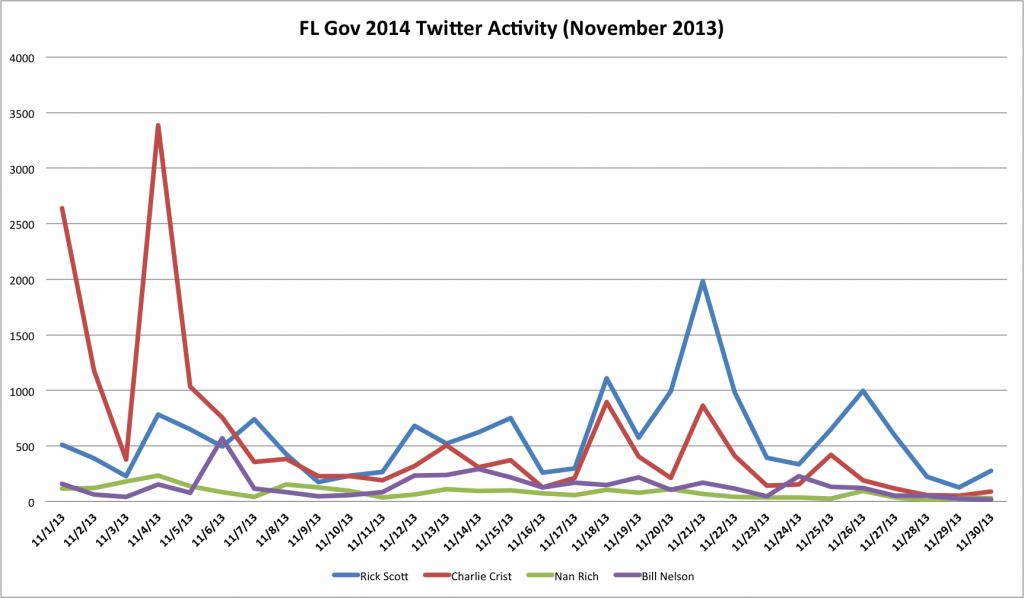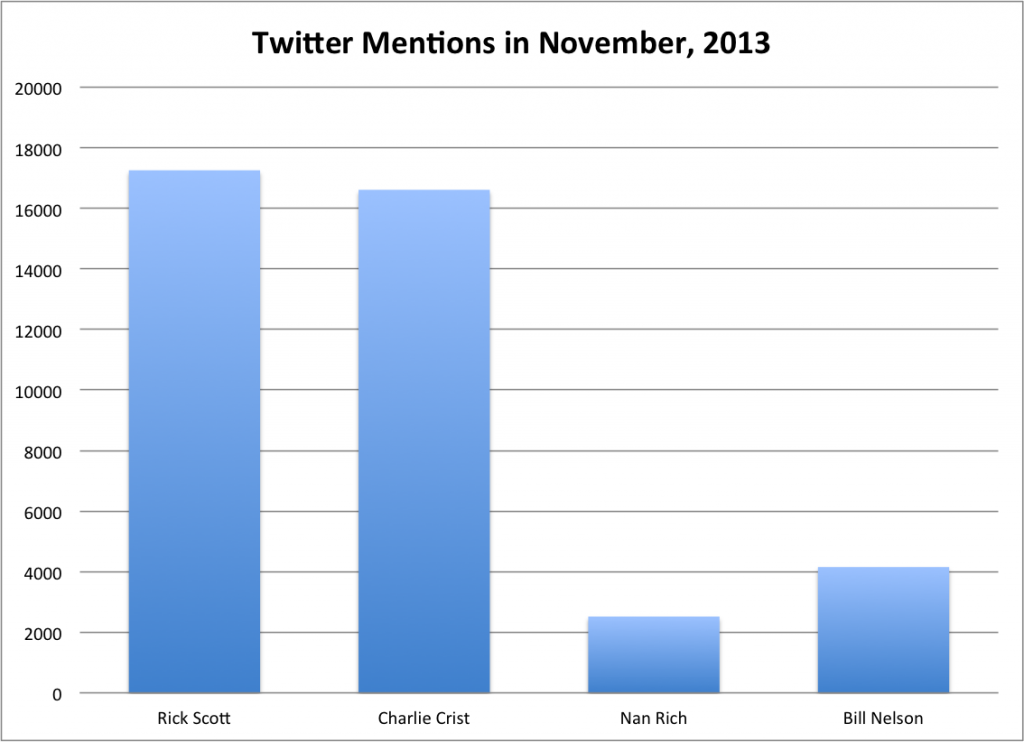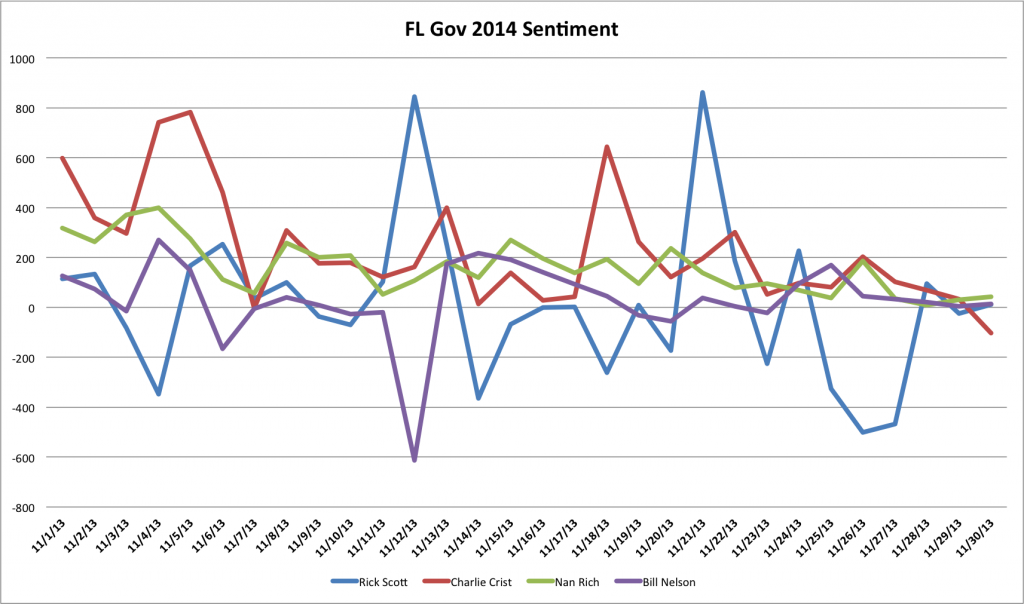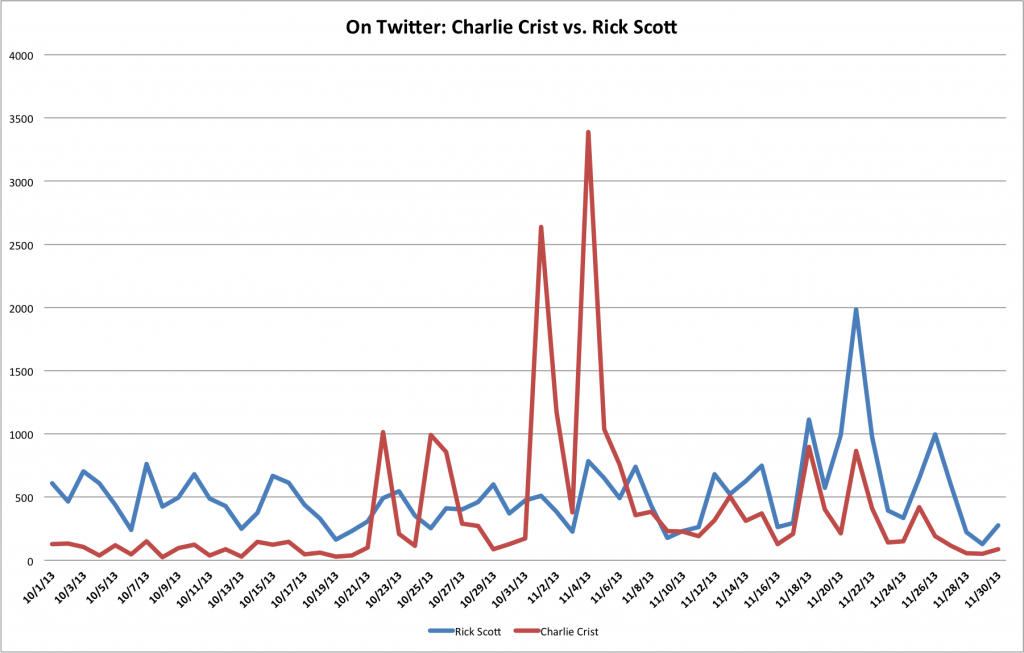The start of November saw Charlie Crist’s filing to run for Florida’s Governor as a Democrat. This was an event so unsurprising that the GOP had attack ads out virtually before his announcement. Still, the announcement caused a splash on Twitter, and Crist managed to dominate the conversation for a few days:
While Crist’s and Scott’s Twitter mentions bumped up and down through the month, Nan Rich’s mentions basically stayed low (along with those of Senator Bill Nelson, who is occasionally mentioned as a possible candidate). When you look at the month as a whole, you can see the problem Rich faces:
Nan Rich isn’t just getting fewer mentions than Scott or Crist, she’s getting an order of magnitude fewer. The only place where Senator Rich is doing better than the other candidates is in terms of sentiment, which is a metric of the volume of positive words vs. negative words in tweets:
Senator Rich’s average sentiment, over the month, was positive, while Scott’s and Crist’s mentions were averaging very weakly positive. Not a lot of people discuss Rich, but those that do tend not to be anti-Rich.
Still, things aren’t all smooth sailing for Charlie Crist, even against Nan Rich. Crist only gets Twitter buzz when there’s something big and newsworthy (like his announcement). Shortly after the announcement Crist’s level of mentions dropped considerably; he has no real follow-through in terms of driving the conversation. After November 6th, there was only one day where Crist managed to (barely) outpace Rick Scott on Twitter. In some ways, the two moved in parallel, but with Scott consistently doing better.
When we zoom out to the past two months, we see that absent real news, Twitter’s been dead for Crist:
It can’t be good that Crist’s mentions have returned to their pre-announcement doldrums at the end of November; that increases the risk that social media is going to be impotent for his campaign.
As sitting governor, Rick Scott can create (or at least participate in) news on a daily basis. While Charlie Crist may have a few big news-making policy announcements now and then, other than those the only news about him is going to be outside of his control and liking: the horse-race story, polls, attack ads, endorsements, and reactions to other events. He cannot rely on news to drive the conversation about him on social media, because he cannot control the news.
And that’s the key thing: for the challenger, social media is not about controlling the news, or even so much about controlling the conversation. It’s about forming a reservoir of good will that dampens the bad news and highlights the good. It’s what you do when there’s nothing big happening. It’s about building a connection with your audience by paying attention to them when you want nothing from them other than a personal connection.
People like to mention how high the current Governor’s negatives are. And that’s true. But if you look at Rick Scott’s use of Twitter (you can see an analysis of his account here), he is doing all the right things: He posts frequently. His tweets have pictures — of other people with him. He’s highlighting good news, accomplishments, events. And he frequently mentions other people. As a result, the Governor has managed to make Twitter a net positive for him, even in an otherwise hostile political environment. When Scott, for example, goes to a ground breaking for Hertz, his tweet gets a handful of snarky remarks, but far more retweets and favorites. It’s a win for him.
Charlie Crist, on the other hand (see a report on him here), virtually ignored Twitter until mid-October, and still has several mechanical problems with his usage:
- He does not tweet frequently enough or consistently enough.
- He does not mention enough other people and groups to encourage others to retweet his content. It’s too much all about Charlie Crist.
- He’s using HootSuite, which is great, but he is using HootSuite’s built-in photo sharing, which is horrible: Photos shared with the native Twitter app get auto-expanded in people’s timelines, while HootSuite’s don’t. This means that only a tiny fraction of his audience see his photos. Tweets with auto-expanding photos get retweeted far more often than those without.
- He’s not using hashtags. If nothing else, a #Sayfie tag should go on every tweet. (#sayfie is the hashtag that alerts people to Florida political content.) Hashtags make it more likely that people will find his tweets.
Net net, Charlie Crist is not creating “re-tweetable” content, while Rick Scott is.
I’ve heard it said that Charlie Crist is good at retail politics. Borders Books was good at retail commerce, too, but they just demolished the abandoned Borders building in Winter Park. That’s what happens to your business model when you’re not good at the Internet.
I mentioned that the benefit of social media is to build up a reservoir of good will that can support your efforts and give you resiliency through the ups and downs of the campaign. But right now, Charlie Crist’s reservoir is nearly empty. The elephant in the room is that Crist’s support may be a mile wide, but it looks to be an inch deep as measured on Twitter. Fixing that problem is paramount to winning the race.
Footnote:
Charlie, if the problem is just a lack of good ideas, I humbly offer my Polititweet, a free web app that helps generate political tweets (based upon an analysis of a massive number of actual political tweets). At least it might be food for thought…





Pingback: As Crist’s new campaign manager comes aboard, was November a “lost month”? - SaintPetersBlog
Pingback: Sunburn for 12/3 – A morning read of what’s hot in Florida politics - SaintPetersBlog